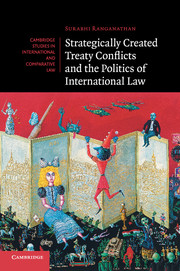Crossref Citations
This Book has been
cited by the following publications. This list is generated based on data provided by Crossref.
2016.
The Doctrine of Odious Debt in International Law.
p.
223.
2016.
Exclusion from Public Space.
p.
552.
Iyi, John-Mark
2016.
Humanitarian Intervention and the AU-ECOWAS Intervention Treaties Under International Law.
p.
251.
Rachovitsa, Adamantia
2017.
THE PRINCIPLE OF SYSTEMIC INTEGRATION IN HUMAN RIGHTS LAW.
International and Comparative Law Quarterly,
Vol. 66,
Issue. 3,
p.
557.
2017.
Between Fragmentation and Democracy.
p.
14.
Mugabi, Ivan K.
2018.
An Analysis of the Adequacy of Protection Afforded by the Convention on the Rights of Persons with Disabilities (CRPD) in Situations of Armed Conflict.
Societies,
Vol. 8,
Issue. 2,
p.
28.
List, Martin
and
Rolf, Jan Niklas
2018.
Kultur in den internationalen Beziehungen.
p.
41.
Krueger, Anna
2018.
Die Bindung der Dritten Welt an das postkoloniale Völkerrecht.
Vol. 264,
Issue. ,
p.
125.
Humrich, Christoph
2018.
Ordnung und Regieren in der Weltgesellschaft.
p.
211.
2019.
Sovereignty in China.
p.
275.
Dunworth, Treasa
2020.
Humanitarian Disarmament.
Cormier, Monique
2020.
The Jurisdiction of the International Criminal Court over Nationals of Non-States Parties.
Storr, Cait
2020.
International Status in the Shadow of Empire.
2020.
International Status in the Shadow of Empire.
p.
300.
2020.
Humanitarian Disarmament.
p.
257.
2021.
The League of Nations and the Protection of the Environment.
p.
386.
2021.
Minorities and the Making of Postcolonial States in International Law.
p.
346.
2021.
International Investment Law and Legal Theory.
p.
358.
2021.
State Responsibility and Rebels.
p.
231.
2021.
The Crime of Aggression under the Rome Statute of the International Criminal Court.
p.
458.



